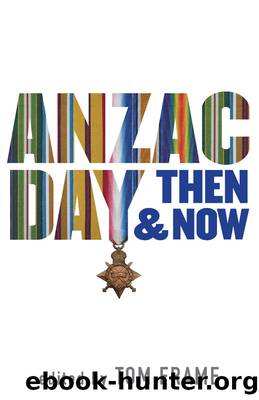Anzac Day Then & Now by Frame Tom;

Author:Frame, Tom;
Language: eng
Format: epub
Publisher: University of New South Wales Press
Published: 2016-03-22T00:00:00+00:00
9
THE FALL AND RISE OF ANZAC DAY? 1965â1990
JEFFREY GREY
I first started going to the Dawn Service at the Australian War Memorial (AWM) in 1974. In those days it was a sparsely attended event, easily accommodated within the sandstone cloisters which house the tablets of the Roll of Honour. I could turn up with perhaps fifteen minutes to spare and readily gain entry to the proceedings. Still in the middle years of high school, I was easily the youngest attendee among a group of mostly Second World War veterans and their families, together with younger members of the regular armed forces posted to Canberra. National servicemen from the nationâs recent and illstarred foray to South Vietnam â easily identifiable with their two distinctive service medals â were conspicuously absent, at least in those years. The service was intimate, with only a few hundred attendees holding candles in the courtyard and cloisters. When the candlelight bounced off the yellow sandstone in the darkness it attained an added emotional, almost spiritual, dimension. It was beautiful and moving in equal parts and, like many of the best elements of older Anzac Day commemoration, it is gone forever.
In recent times attendance at the Dawn Service has become a mass participation event attracting thousands who have no direct or obvious connection to the Great War or to military service more generally. The enthusiastic association with the Anzac Day ceremony adopted by politicians of all persuasions was both unknown and would have been stoutly resisted by the generation of veterans who established it; saturation coverage by the media was not a characteristic feature of earlier eras either. When Australian veterans made a pilgrimage of return to Gallipoli on the 50th anniversary of the campaign in 1965, they were accompanied by neither politicians nor journalists while just four young âbackpackersâ (as we would now term then) made their own arrangements to be on site for the occasion. The tour received some support and assistance from the Australian embassy in Istanbul, since at that time the Gallipoli peninsula was a restricted area under the control of the Turkish Army, but most of the arrangements were made by the RSL organisers. The contrast fifty years later is striking.
There is a broad perception that support for and observance of Anzac Day went into decline between the 50th anniversary of the Dardanelles campaign in 1965 and the 75th in 1990. The consensus conservatives and traditionalists perceived around marking Anzac Day as a solemn national day seemed under challenge from all sides. The decline in âsolemnityâ and the breaking down of the âclosedâ atmosphere of observance had concerned some since the early 1950s. But as Ken Inglis rightly observes, there had never been a uniform observance of Anzac Day between any two states; even the RSLâs national congress failed to arrive at agreement on what this might entail.1 In the 1970s, though, observance seemed to be under an increasingly sustained attack. Some even pointed to Anzac Dayâs ultimate demise.
This shift in public behaviour
Download
This site does not store any files on its server. We only index and link to content provided by other sites. Please contact the content providers to delete copyright contents if any and email us, we'll remove relevant links or contents immediately.
| Africa | Americas |
| Arctic & Antarctica | Asia |
| Australia & Oceania | Europe |
| Middle East | Russia |
| United States | World |
| Ancient Civilizations | Military |
| Historical Study & Educational Resources |
The Memory Code by Lynne Kelly(2272)
Schindler's Ark by Thomas Keneally(1759)
Kings Cross by Louis Nowra(1681)
Burke and Wills: The triumph and tragedy of Australia's most famous explorers by Peter Fitzsimons(1310)
The Falklands War by Martin Middlebrook(1295)
1914 by Paul Ham(1271)
Code Breakers by Craig Collie(1179)
Paradise in Chains by Diana Preston(1174)
Burke and Wills by Peter FitzSimons(1170)
Watkin Tench's 1788 by Flannery Tim; Tench Watkin;(1166)
A Farewell to Ice: A Report from the Arctic by Peter Wadhams(1160)
The Secret Cold War by John Blaxland(1152)
The Protest Years by John Blaxland(1120)
30 Days in Sydney by Peter Carey(1081)
The Lucky Country by Donald Horne(1076)
Lucky 666 by Bob Drury & Tom Clavin(1062)
THE LUMINARIES by Eleanor Catton(1062)
The Land Before Avocado by Richard Glover(1045)
Not Just Black and White by Lesley Williams(1013)
